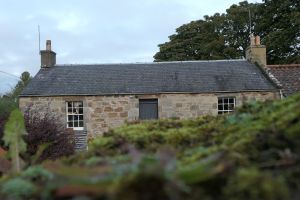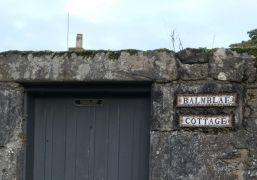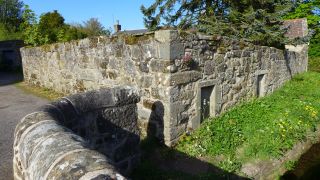Difference between revisions of "Balmblae Cottage"
Jump to navigation
Jump to search
| Line 17: | Line 17: | ||
|} | |} | ||
__NOTOC__ | __NOTOC__ | ||
| − | '''Balmblae Cottage''' is a house in [[Balmblae]], Falkland, located within the walls of the [[Falkland Palace gardens]] and just across the [[Mill Wynd Bridge]]. It was formerly the residence of the Palace gardener. Part of the surrounding wall, next to the [[Balmblae Burn]], includes windows from a previous building. | + | '''Balmblae Cottage''' is a house in [[Balmblae]], Falkland, located within the walls of the [[Falkland Palace gardens]] and just across the [[Mill Wynd Bridge]]. It was formerly the residence of the Palace gardener. Part of the surrounding wall, next to the [[Balmblae Burn]], includes windows from a previous building. |
{| class=wikitable | {| class=wikitable | ||
| Line 34: | Line 34: | ||
==Further images== | ==Further images== | ||
<gallery mode=packed> | <gallery mode=packed> | ||
| − | File:Bamblae Cottage2.JPG|Name plate by front gate. | + | File:Bamblae Cottage2.JPG|Name plate by front gate |
| + | File:Mill Wynd Bridge 3.JPG|Remains of ruined building seen from the bridge | ||
</gallery> | </gallery> | ||
==Notes== | ==Notes== | ||
Revision as of 13:04, 14 October 2021
| Building summary | |
|---|---|

| |
| Name | Balmblae Cottage |
| Address | Balmblae, Falkland |
| Postcode | KY15 7BS |
| Date | 17th–19th centuries |
| OS grid ref | NO 25217 07441 |
| Latitude & longitude | 56°15′13″N 3°12′31″W |
Balmblae Cottage is a house in Balmblae, Falkland, located within the walls of the Falkland Palace gardens and just across the Mill Wynd Bridge. It was formerly the residence of the Palace gardener. Part of the surrounding wall, next to the Balmblae Burn, includes windows from a previous building.
| HES listing details[1] | ||
|---|---|---|
| Reference: LB8802 | Date: 01/02/1972 | Category: B |
| Address/Site Name
Balmblae Cottage including garden walls Balmblae, Falkland | ||
| Description
Cottage is mid 19th century, single-storey: north section is 2-window and centre door, rubble and slate; south section 3-window and door rubble and pantile. Rubble-built enclosing walls, built-up archway with chamber probably of 17th century date. | ||

